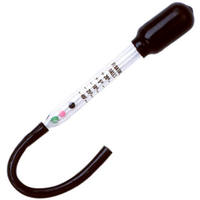
At a minimum, radiator fluid should be changed once per year. If you race, at least twice a year. When you do this, it's a good idea to flush the system with white vinegar and distilled water (50/50 ratio).
After you've drained the old coolant, fill it up with the vinegar/water solution, run your engine until warm. Drop the solution and fill with clean water to flush the system. Drain the water and fill to the correct level with your favorite coolant. Do not overfill.
The acid in the vinegar does a good job of cleaning out the old coolant and contaminants but will not harm engine seals.
In terms of coolant, there are lots of choices and you can't go wrong using what your manual recommends. Most coolants are ethylene glycol based, so make sure to dispose of it where your pets (and young kids) aren't exposed to it. Because it's sweet smelling and tasting to them, they'll drink it and if they ingest enough, dead puppy or kitty.
I personally use Engine Ice. It's propylene glycol based, making it much less toxic to humans, animals plants, etc... and it's premixed with distilled water, ready to run with freeze protection down to -26 and a boiling point of +256.
If you live where winters are cold and you choose not use a premixed coolant/antifreeze, be sure to check the mixture with a hydrometer. You can get them for cheap at just about any auto parts store. You simply suck up some fluid, count how many balls float and cross reference the number of the freeze protection chart.
Also, the specific gravity of ethylene glycol and propylene glycol are not the same, so make sure that you use the correct hydrometer. For example, Engine Ice claims freeze protection to -26, but an ethylene glycol specific hydrometer will read only to +20. Not a problem per se in this example (you'd still be well protected), but the other way around could be trouble. I've found that some hydrometers just don't specifically say what coolant they are for. However, most are for the more traditional ethylene glycol.
Hopefully this is of value to some and I've always had excellent results following these practices. May winter come late and that you log lots of happy, trouble-free miles.








Recommended Comments
There are no comments to display.
Join the conversation
You can post now and register later. If you have an account, sign in now to post with your account.